Galileo Study guides, Class notes & Summaries
Looking for the best study guides, study notes and summaries about Galileo? On this page you'll find 454 study documents about Galileo.
Page 4 out of 454 results
Sort by
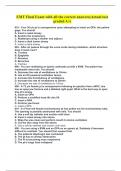
-
UT Online High School Chemistry A Final Exam Thorough Review, Complete Solution
- Exam (elaborations) • 32 pages • 2024
-
- $10.99
- + learn more
UT Online High School Chemistry A Final Exam Thorough Review, Complete Solution Accuracy how close a measurement is to the true value dependent variable changes in response to the independent variable (what you measure in an experiment and what's affected during the experiment) Hypothesis a proposed explanation for an observation Independent variable (often denoted by x) doesn't depend on something else Scientific notation how scientists handle large or small numbers Significant Fig...
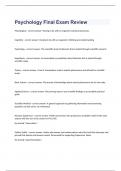
-
Psychology Final Exam Review 2023 with 100% correct answers
- Exam (elaborations) • 11 pages • 2023
-
- $17.49
- + learn more
Physiological Having to do with an organism's physical processes. Cognitive Having to do with an organism's thinking and understanding Psychology The scientific study of behavior that is tested through scientific research Hypothesis An assumption or prediction about behavior that is tested through scientific study. Theory A set of assumptions used to explain phenomena and offered for scientific study. Basic Science The pursuit of knowledge about natural...
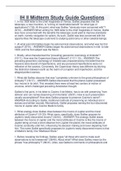
-
IH II Midterm Study Guide Questions
- Exam (elaborations) • 12 pages • 2023
-
- $13.09
- + learn more
IH II Midterm Study Guide Questions 1. In his 1609 letter to the chief magistrate of Venice, Galileo proposes that the telescope, a new invention, is "a thing of inestimable benefit" for what type of applications? (7/8). At this point, what was Galileo "obviously more concerned with"? (9/10). - ANSWER-When writing his 1609 letter to the chief magistrate of Venice, Galilei was more concerned with the benefits the telescope could yield to improve standards on earth, namely navigatio...
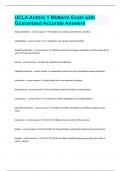
-
UCLA Anthro 1 Midterm Exam with Guaranteed Accurate Answers
- Exam (elaborations) • 17 pages • 2024
-
- $13.89
- + learn more
Natural Selection - correct answer Evolution by variation and selective retention Morphology - correct answer an organism's size, shape, and composition Stabilizing Selection - correct answer Selection required to change a population and then keep it the same for future generations species - correct answer dynamic population of individuals individual selection - correct answer adaptation results from the competition among individuals continuous - correct answer grade slowly from ...
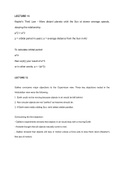
-
NATS 1740: EXAM NOTES
- Exam (elaborations) • 36 pages • 2023
- Available in package deal
-
- $14.49
- + learn more
LECTURE 11: Kepler's Third Law - More distant planets orbit the Sun at slower average speeds, obeying the relationship. p^2 = a^3 p = orbital period in years; a = average distance from the Sun in AU To calculate orbital period: a^3 then sqrt() your result of a^3 or in other words, p = √(a^3) LECTURE 12: Galileo overcame major objections to the Copernican view. Three key objections rooted in the Aristotelian view were the following: 1. Earth could not be moving because objects in a...
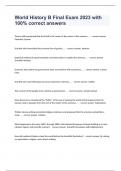
-
World History B Final Exam 2023 with 100% correct answers
- Exam (elaborations) • 6 pages • 2023
-
- $16.49
- + learn more
Theory which proposed that the Earth is the center of the center of the universe..... - correct answer Ptolemaic System Scientist who formulated the universal law of gravity..... - correct answer Newton Empirical method of experimentation and observation to explain the universe.... - correct answer Scientific Method Economic idea where the government does not interfere with economics..... - correct answer Laissez Faire Scientist who used telescopes to prove Copernicus' theor...
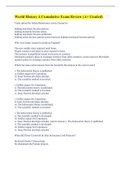
-
World History A Cumulative Exam Review (A+ Graded)
- Exam (elaborations) • 20 pages • 2023
-
Available in package deal
-
- $12.99
- + learn more
Trade spread the Italian Renaissance across Europe by helping merchants become patrons. helping monarchs become artists. helping merchants become politicians. helping artists become patrons correct answers helping merchants become patrons. Why were banks created in medieval England? The new middle class required small loans. People wanted a safe place to store expensive items. The increase in population meant an increase in currency. Merchants needed a place to exchange currency f...
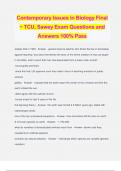
-
Contemporary Issues in Biology Final ~ TCU, Sawey Exam Questions and Answers 100% Pass
- Exam (elaborations) • 21 pages • 2024
- Available in package deal
-
- $13.49
- + learn more
Contemporary Issues in Biology Final ~ TCU, Sawey Exam Questions and Answers 100% Pass scopes trial in 1925 - Answer- -general science teacher who broke the law in tennessee against teaching "any story that denies the story of the divine creation of man as taught in the bible, and to teach that man has descended from a lower order animal" -found guilty and fined -since this trial, US supreme court has ruled in favor of teaching evolution in public schools galileo - Answer- -exposed th...
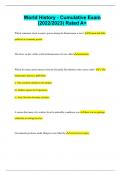
-
World History - Cumulative Exam (2022/2023) Rated A+
- Exam (elaborations) • 5 pages • 2024
-
- $11.08
- + learn more
Which statement about women's power during the Renaissance is true? Women had little political or economic power. The focus on the visible world in Renaissance art was called naturalism. Which list states achievements from the Scientific Revolution in the correct order? i. The heliocentric theory is published. ii. The scientific method is developed. iii. Galileo argues for Copernicus. iv. Isaac Newton develops calculus.
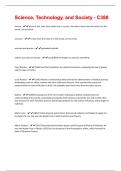
-
Science, Technology, and Society - C388 Questions With 100% Correct Answers.
- Exam (elaborations) • 11 pages • 2023
- Available in package deal
-
- $8.49
- + learn more
Precise - pinch of salt, how close values are in a series. Accurate is how close the value is to the actual, correct value. accurate - is how close the value is to the actual, correct value. accurate and precise - graduated cylinder neither accurate nor precise - using different lengths to measure something Isaac Newton - (1665) laid the foundations for classical mechanics, explaining the law of gravity and the laws of motion. Louis Pasteur - (1856) Pasteur contributed greatly towards the...

$6.50 for your textbook summary multiplied by 100 fellow students... Do the math: that's a lot of money! Don't be a thief of your own wallet and start uploading yours now. Discover all about earning on Stuvia


